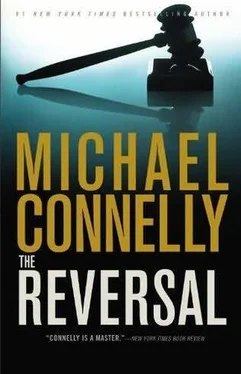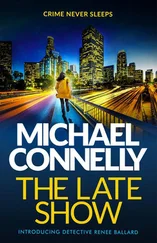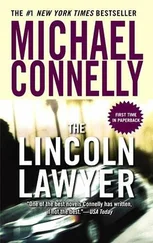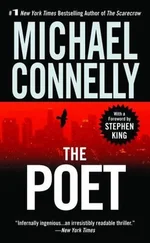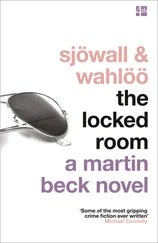They entered the studio and Gleason was waiting for them, with her gloves off and her mask folded up to reveal her face. She had obviously been told by the smoker that they were potential customers and Bosch initially did nothing to dissuade her of that interpretation. He didn’t want to reveal their true business until they were alone with her.
“I’m Harry and this is Maggie. Sorry to barge in like this.”
“Oh, no problem. We like it when people get a chance to see what we do. In fact, we’re right in the middle of a project right now and need to get back to it. You’re welcome to stay and watch and I can tell you a little bit about what we’re doing.”
“That would be great.”
“You just have to stay back. We’re dealing with very hot material here.”
“Not a problem.”
“Where are you from? Seattle?”
“No, actually we’re all the way up from California. We’re pretty far from home.”
If the mention of her native state caused Gleason any concern, she didn’t show it. She pulled the mask back down over a smile, put her gloves on and went back to work. Over the next forty minutes Bosch and McPherson watched Gleason and her two assistants finish the glass piece. Gleason provided a steady narration as she worked, explaining that the three members of her team had different duties. One of the young men was a blower and the other was a blocker. Gleason was the gaffer, the one in charge. The piece they were sculpting was a four-foot-long grape leaf that would be part of a larger piece commissioned to hang in the lobby of a business in Seattle called Rainier Wine.
Gleason also filled in some of her recent history. She said she started her own studio only two years ago after spending three years apprenticing with a glass artist in Seattle. It was useful information to Bosch. Both hearing her talk about herself and watching her work the soft glass. Gathering color, as she called it. Using heavy tools to manipulate something beautiful and fragile and glowing with red-hot danger all at the same time.
The heat from the furnace was stifling and both Bosch and McPherson took off their jackets. Gleason said the oven burned at 2,300 degrees and Bosch marveled at how the artists could spend so many hours working so close to the source. The glory hole, the small opening into which they repeatedly passed the sculpture to reheat and add layers, glowed like the gateway to Hell.
When the day’s work was completed and the piece was placed in the finishing kiln, Gleason asked the assistants to clean up the studio before heading home. She then invited Bosch and McPherson to wait for her in the office while she got cleaned up herself.
The office doubled as a break room. It was sparely furnished with a table and four chairs, a filing cabinet, a storage locker and a small kitchenette. There was a binder on the table containing plastic sleeves with photos of glass pieces made previously in the studio. McPherson studied these and seemed taken with several. Bosch took out the file he had been carrying inside his jacket and put it down on the table ready to go.
“It must be nice to be able to make something out of nothing,” McPherson said. “I wish I could.”
Bosch tried to think of a response but before he could come up with anything the door opened and Sarah Gleason entered. The bulky mask, apron and gloves were gone and she was smaller than Bosch had expected. She barely crested five feet and he doubted there were more than ninety pounds on her tiny frame. He knew that childhood trauma sometimes stunted growth. So it was no wonder Sarah Gleason looked like a woman in a child’s body.
Her auburn hair was down now instead of tied into a knot behind her head. It framed a weary face with dark blue eyes. She wore blue jeans, clogs and a black T-shirt that said Death Cab on it. She headed directly to the refrigerator.
“Can I get you something? Don’t have any alcohol in here but if you need something cold…”
Bosch and McPherson passed. Harry noticed she had left the door to the office open. He could hear someone sweeping in the studio. He stepped over and closed it.
Gleason turned from the refrigerator with a bottle of water. She saw Bosch closing the door and a look of apprehension immediately crossed her face. Bosch raised one hand in a calming gesture as he pulled his badge with the other.
“Ms. Gleason, everything is okay. We’re from Los Angeles and just need to speak privately with you.”
He opened his badge wallet and held it up to her.
“What is this?”
“My name is Harry Bosch and this is Maggie McPherson. She is a prosecutor with the L.A. County District Attorney’s Office.”
“Why did you lie?” she said angrily. “You said you wanted a piece made.”
“No, actually we didn’t. Your assistant, the blocker, just assumed that. We never said why we were here.”
Her guard was clearly up and Bosch thought they had blown their approach and with that the opportunity to secure her as a witness. But then Gleason stepped forward and grabbed the badge wallet out of his hand. She studied it and the facing ID card. It was an unusual move, taking the badge from him. No more than the fifth time that had ever happened to Bosch in his long career as a cop. He saw her eyes hold on the ID card and he knew she had noticed the discrepancy between what he had said his name was and what was on the ID.
“You said Harry Bosch?”
“Harry for short.”
“Hieronymus Bosch. You’re named after the artist?”
Bosch nodded.
“My mother liked the paintings.”
“Well, I like them, too. I think he knew something about inner demons. Is that why your mother liked him?”
“I think so, yeah.”
She handed the badge wallet back to him and Bosch sensed a calmness come over her. The moment of anxiety and apprehension had passed, thanks to the painter whose name Bosch carried.
“What do you want with me? I haven’t been to L.A. in more than ten years.”
Bosch noted that if she was telling the truth, then she had not returned when her stepfather was ill and dying.
“We just want to talk,” he said. “Can we sit down?”
“Talk about what?”
“Your sister.”
“My sister? I don’t-look, you need to tell me what this is-”
“You don’t know, do you?”
“Know what?”
“Sit down and we’ll tell you.”
Finally, she moved to the lunch table and took a seat. She pulled a soft pack of cigarettes out of her pocket and lit one.
“Sorry,” she said. “It’s my one remaining addiction. And you two showing up like this-I need a smoke.”
For the next ten minutes Bosch and McPherson traded off the story and walked her through the short version of Jason Jessup’s journey to freedom. Gleason showed almost no reaction to the news. No tears, no outrage. And she didn’t ask questions about the DNA test that had sprung him from prison. She only explained that she had no contact with anyone in California, owned no television and never read newspapers. She said they were distractions from work as well as from her recovery from addiction.
“We’re going to retry him, Sarah,” McPherson said. “And we’re here because we’re going to need your help.”
Bosch could see Sarah turn inward, to start to measure the impact of what they were telling her.
“It was so long ago,” she finally responded. “Can’t you just use what I said from the first trial?”
McPherson shook her head.
“We can’t, Sarah. The new jury can’t even know there was an earlier trial because that could influence how they weigh the evidence. It would prejudice them against the defendant and a guilty verdict wouldn’t stand. So in situations where witnesses from the first trial are dead or mentally incompetent, we read their earlier testimony into the trial record without telling the jury where it’s from. But where that’s not the case, like with you, we need the person to come to court and testify.”
Читать дальше
